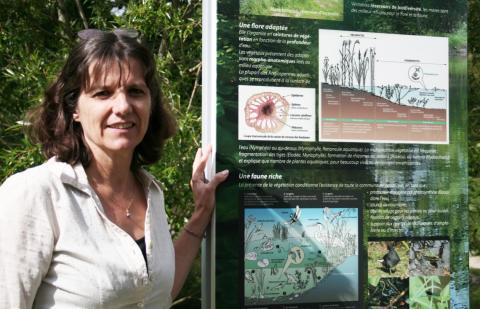
Jane Lecomte: Restoring biodiversity's freedom
Jane Lecomte is the director of the Ecology, Systematics and Evolution Laboratory (ESE - AgroParisTech / CNRS / Université Paris-Sud) and Sustainable Development Project Manager at Université Paris-Sud. A specialist in ecology, this researcher has made biodiversity both a cutting-edge scientific expertise and a personal commitment.
Jane Lecomte's ESE laboratory is one of the few laboratories in France that focuses on both aspects of ecology, i.e evolutionary and functional, and evolution. "Our research topics cover both the origin and dynamics of biodiversity and the evolution and functioning of ecosystems and socio-ecosystems. The effects of global changes, particularly climate change, on biodiversity is a cross-cutting theme for all teams," says the researcher.
The DNA of pluridisciplinarity
"Ecology is multidisciplinary by definition because it is the study of the interactions between living beings and their environment," continues Jane Lecomte. This scientific discipline combines the life sciences with chemistry, physics, geosciences, climate sciences, mathematics, and the human and social sciences. "One of our teams studies the interactions between ecological systems and human societies. Two economists and an eco-anthropologist are seeking to better understand the dynamics of non-human biodiversity with the functioning of our society."
The other characteristic of ecology is to carry out statistical, mechanistic, or theoretical modelling approaches. "We are facing very complex systems and are engaged in a dynamic of scenarios that extrapolate the evolution of these ecosystems in the long term. »
From Mont Lozère to the Saclay plateau
"As a child, I was very close to nature, I loved ecology even before I knew what it was," says Jane Lecomte. After a master's degree in biology and biochemistry at ENS-Paris, she defended her thesis in 1993, obtained a position as a temporary teaching and research associate (ATER) at Université Paris-Sud and was then recruited at the ESE laboratory. While her first research focused on Mont Lozère’s animal populations and their dynamics and viability regards to their habitat fragmentation, the researcher turned to plants once she joined ESE. "There was a strong need for scientific expertise on the ecological risks associated with the release of transgenic plants and their genes into the environment." For ten years, she carried out field monitoring, experimentation and modelling work on this issue. She was a member of the first scientific committee of the High Council for Biotechnology from 2009 to 2014.
Towards a "greening" of agricultural environments
Jane Lecomte then realized the link between her first research in environments with very low anthropization and the one in environments that are very disturbed by humans. "We are studying how semi-natural environments could be arranged within agricultural landscapes in order to best benefit from the services provided by biodiversity. The bio-aggressors of a field are either eradicated by pesticides or by conservation biological control. The latter consists in mobilizing the natural enemies of these bio-aggressors. It is one of the approaches used in agroecology. " One stone, two shots: in the same time one can reduce the negative effects of pesticides on human and non-human health and allow wild biodiversity to reinvest in agrosystems.
An ethics of biodiversity
Nowadays, advocating an environmental ethic, the researcher defends an evocative approach to biodiversity. "We must consider our relationship with non-humans and their evolution beyond our anthropocentric interests, which means, in particular, reducing our footprint on the living. Leaving degrees of freedom to the living is enough to make it more resilient to disturbances so that it could adapt itself and continue its evolutionary trajectory." This observation is corroborated by many scientific results for which Jane Lecomte is fighting, for their better consideration by politicians and scientists. "We know what needs to be done to stem the erosion of biodiversity and also that climate change requires lowering the temperature by one degree. It has taken 30 years to mobilize on climate issues, and it is extremely important. But so are the challenges of biodiversity and we must act quickly! " From this point of view, Jane Lecomte welcomes the fact that "the link with the public sphere has finally been established" thanks to the media coverage of the IPBES report.
